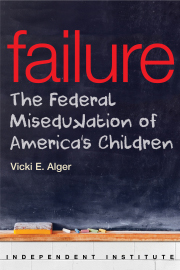Most Americans support wider private-school options for all families, according to the newly released 2018 Education Next Poll.
This finding flies in the face of the highly politicized onslaught to discredit U.S. Education Secretary Betsy DeVos and the Trump administration for being, among other things, “out of touch ... with what works best for students, parents, educators and communities,” as National Education Association President Lily Eskelsen García put it.
Based on the poll, however, it appears that opponents of educational choice like the NEA are the ones who’ve lost touch—big time.Fully 54 percent of all respondents in Education Next’s nationally representative poll favor giving all public-school parents the option of sending their children to private schools with government helping to pay tuition.
Not only has overall support for universal private-school options increased by 9 percentage points since 2017, bipartisan support has also increased. Among Republicans support increased 10 points since last year to 64 percent. Among Democrats it increased 7 points to 47 percent.
Majorities of Americans also support universal private-school choice regardless of their racial or ethnic backgrounds, including 53 percent each among black and white Americans, as well as 67 percent of Hispanic Americans.
The only group with a majority opposed are teachers, whose support dropped from 40 percent last year to 34 percent this year—a stark contrast to the 61 percent of parents who favor universal private-school choice.
Compared to support for private-school options for all families, support for wider publicly funded options targeting just some families is 11 points lower at 43 percent. However, context matters.
When poll authors replaced the phrase “wider choice” with the word “voucher,” support for making all public-school families eligible dropped 10 percentage points. Yet there was no significant change in support when it came to offering low-income families private-school vouchers.
Similarly, the Education Next poll found that a majority of Americans, 57 percent, also support privately funded tax-credit scholarships for low-income students. Unlike voucher scholarships, which are government funded, these scholarships are funded through private tax-credited donations to nonprofit organizations.
Support for low-income-student tax-credit scholarships includes 58 percent of Republicans and Democrats, 61 percent of blacks, 62 percent of parents, and 68 percent of Hispanics. Support among teachers for tax-credit scholarships is also higher than for publicly funded voucher scholarships at 47 percent overall and 49 percent of non-union teachers.
Regardless of how the concept is phrased, expanding educational options is clearly popular as private-school parental choice programs proliferate.
Over the past decade, for example, the number of voucher programs has more than doubled since 2009, from 11 to 26. Meanwhile, the number of tax-credit scholarship programs has nearly tripled, from eight programs to 23.
Altogether, voucher and tax-credit scholarship programs in 28 states (including the District of Columbia) are now helping over 450,000 students—more than twice as many as a decade ago.
For those rightfully concerned about D.C.’s influence over education, such growth should be welcome news because it indicates that restoring parental control helps keep the feds at bay. Private schools have more autonomy than their public counterparts over academic standards, curriculum, and testing, depending on whether or to what extent private schools participate in federal programs.
It is also worth recalling that the expansion of educational options occurred during the Obama administration, which along with its teacher-union allies was openly hostile to private-school-choice programs, including the D.C. Opportunity Scholarship Program as well as choice programs in Louisiana and Wisconsin.
The Obama administration’s efforts to end those two state programs failed, and the Trump administration has already reversed Obama-era policies designed to kill the D.C. program.
That is certainly a victory worth celebrating, but the federal government should leave the continued expansion of educational options throughout the rest of the country to parents and the states.
Likewise, opponents of educational choice should come to grips with the fact that they’re not going to convince parents to return to the bad old days when bureaucrats picked their children’s schools based on their families’ zip codes.
As the Education Next poll authors concluded, “Despite heavy criticism of choice-advocate DeVos by union officials and Democratic politicians ... school choice did not lose ground and may well have gained political favor over the past year.”
So it appears the educational choice genie isn’t going back into the bottle any time soon—if ever.









